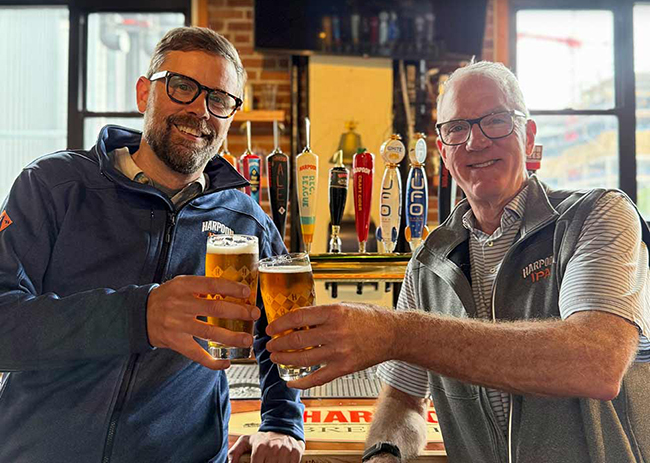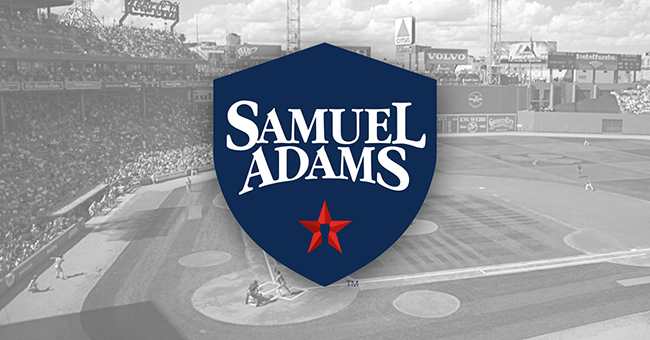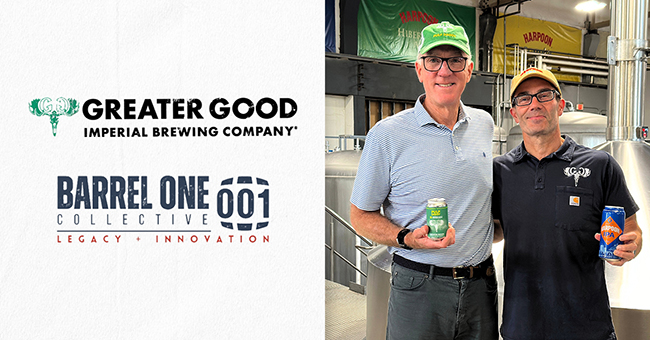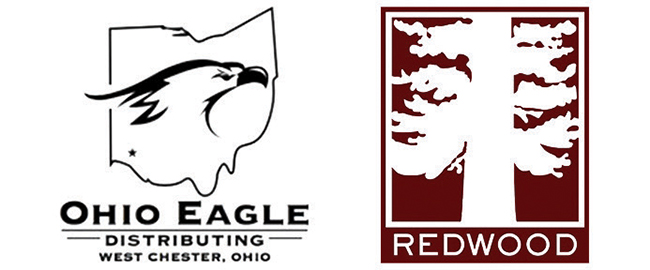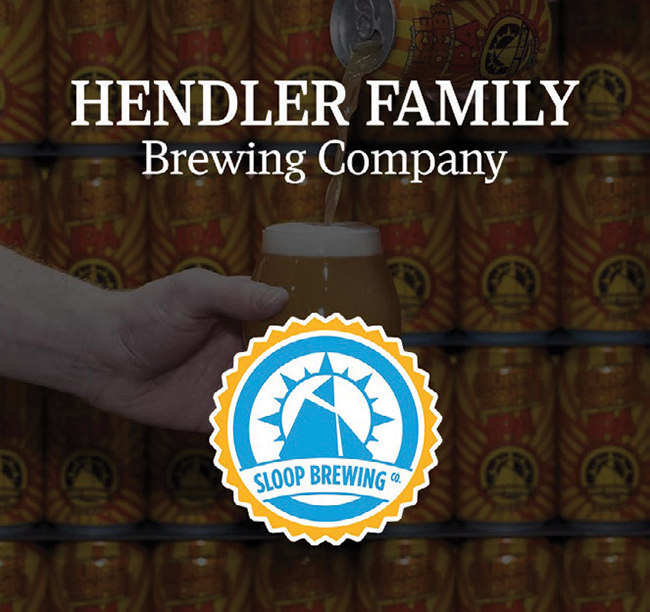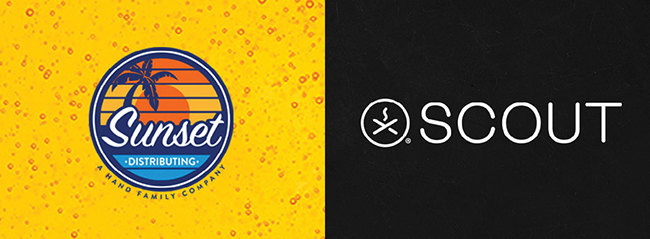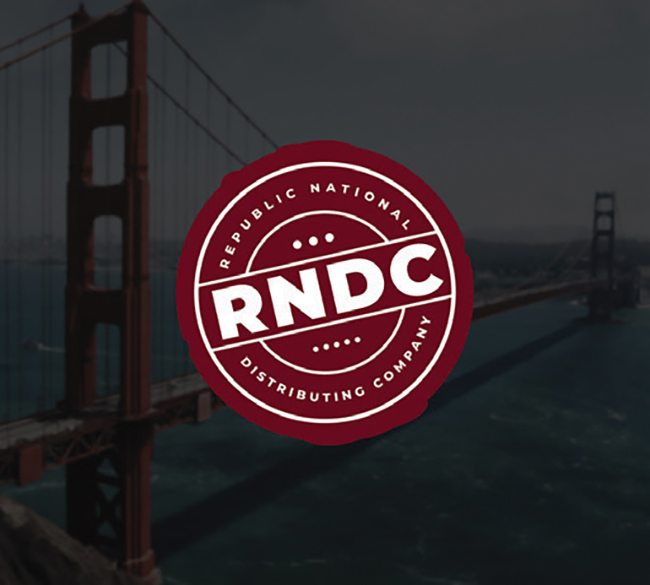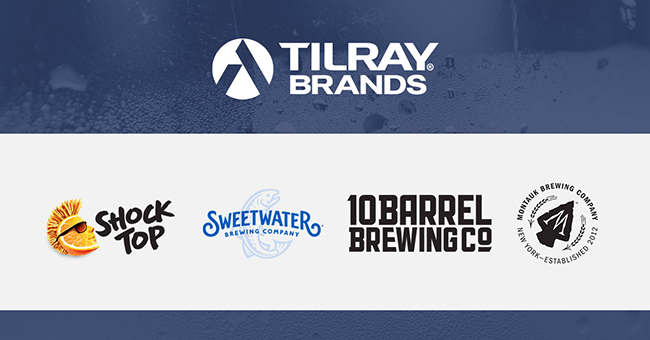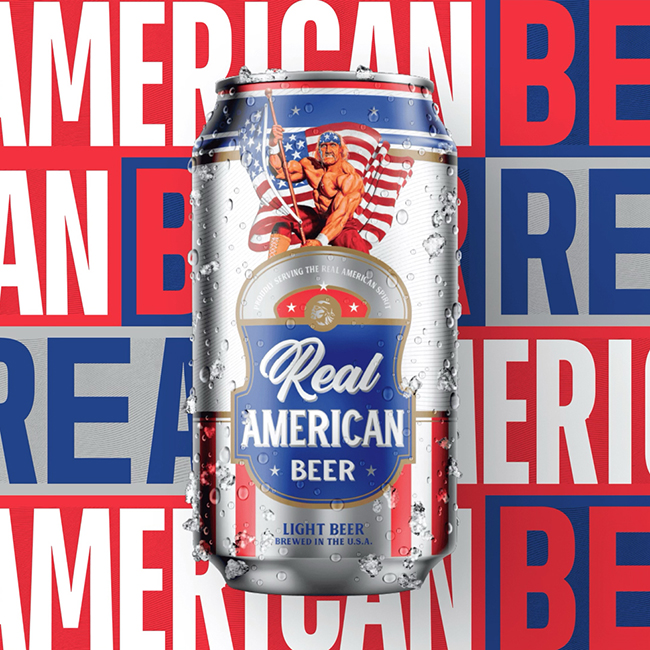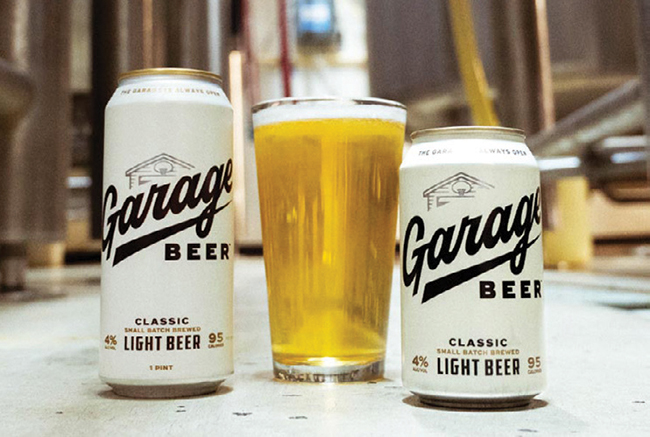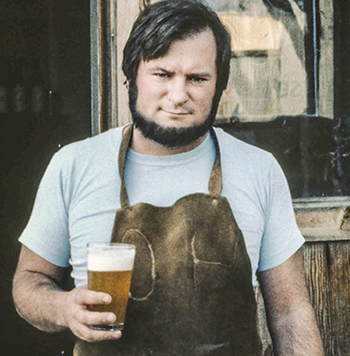Brewscape: The Latest Craft Beer Brand News
Barrel One Collective Taps Nathaniel Davis as CEO; Dan Kenary Shifting to President Following Sabbatical
Barrel One Collective is getting a new leader, a little more than six months after the founding of the New England-centric parent company of 15 brands, including Harpoon and Smuttynose.
Nathaniel Davis will take the reins as CEO from Harpoon founder Dan Kenary, who will transition to the role of president after an eight-week sabbatical. Davis joined Mass. Bay Brewing in April 2023 as chief operations and strategy officer and was named president of the Boston-based craft roll up in August 2023.
“It became very clear to me very quickly this was the person that I hope to be my successor,” Kenary said of Davis. “I’ve taken that very, very seriously, the last three to five years, like, ‘OK, this is out there, I’ve got to set this up and do it right for the company.’ And so I met Nathaniel, and it clicked very quickly to me.
“Culturally, talent-wise, industry experience, he’s the full package in every which way, which is outstanding,” he continued.
Kenary, whose 65th birthday is approaching this summer, started Harpoon in 1986 and stepped into the CEO role in 2014 when co-founder Rich Doyle departed. He steered the company through acquisitions, the COVID-19 pandemic and the merger that created Barrel One in late 2024 – all amidst the backdrop of a challenging craft beer industry that has grown more tumultuous in recent years.
Acknowledging that “there certainly are times when founders can’t get out of the way and are a problem with the new CEO establishing themselves and becoming the focal point of the company,” Kenary went on sabbatical July 16. The time away includes a cross-country road trip with his wife.
“He’s already running a lot of the company,” Kenary said of Davis. “So I think it’s going to be pretty damn seamless, but this is just to ensure that it takes place, because I’m a big personality, and so I think I’ve just got to get out of here for a stretch, so that Nathaniel feels very comfortable that he’s clearly the guy in charge.”
Boston Beer Renews Red Sox Sponsorship for a Decade
Boston Beer has renewed its Samuel Adams sponsorship deal with the Boston Red Sox for another decade.
The new deal extends the 8-year pact between the two brands first struck in 2018 for Samuel Adams to become “the official beer of the Boston Red Sox.”
Through the sponsorship, Samuel Adams took over the right field sponsor sign in historic Fenway Park that had featured Anheuser-Busch’s Budweiser brand for nine years and transformed the right field roof deck into the “Sam Deck.” The company said “more than 275,000 fans have raised a pint of Sam Adams” on the Sam Deck, while the “Sammy’s On Third” branded bard has sold around 50,000 Sam Adams beers last season.
Boston Beer expanded its Fenway presence again in 2022 with the debut of the Truly Terrace above the right field bleachers.
Angry Orchard, Truly Hard Seltzer and Twisted Tea will also be featured in Fenway in the new agreement.
Barrel One Collective to Acquire Greater Good Imperial Brewing
While it was shifting its leadership around, Barrel One Collective was also adding another New England craft brewery to its growing roster.
The Boston-headquartered platform struck a deal to acquire Worcester’s-based Greater Good Imperial Brewing, the only dedicated high-ABV craft producer in the country.
“Greater Good has carved out a distinct space in the craft world with its unapologetically big, flavorful beers and cult following in Central Mass.,” Kenary said. “Their team’s focus on quality, authenticity, innovation and community perfectly aligns with our company values and shared ambition of pushing the boundaries of what craft beer can be.”
All beers in Greater Good’s portfolio are 8% ABV or higher, which gives Barrel One a toehold in the increasingly important high-ABV segment. Coupled with the brewery’s “tremendous wholesaler overlap” with Barrel One’s network, the deal was a slam dunk, Kenary said.
178 Ohio Eagle Employees Face Layoffs Once Sale to Redwood Closes
All 178 Ohio Eagle Distributing employees are expected to be laid off once the company’s sale to Redwood Holdings closes on September 8, Ohio Eagle president Devyn Dugger wrote in a July 7 Worker Adjustment and Retraining Notification (WARN) Act notice to the state.
Dugger wrote that “all separations will be perament; future employment opportunities, if any, will be communicated by the buyer.”
The layoffs cover Ohio Eagle’s facilities in West Chester and Lima. Ohio Eagle employed 124 workers in West Chester and 54 in Lima, including union members of Teamsters Local 1199 and International Brethren of Teamsters Local 908, respectively.
With the sale, Redwood picks up 7 million cases, Beer Marketer’s Insights first reported earlier this week. Ohio Eagle served 18 counties in western Ohio, distributing Anheuser-Busch, Constellation Brands and Yuengling products, as well as local craft beer.
Redwood, the private investment firm for billionaire Jim Davis, will add to its already vast Ohio Anheuser-Busch InBev footprint, which it began building in 2021 with the purchase of Heidelberg Distributing Company. The price tag for Heidelberg, which also covered parts of Kentucky, was reportedly around $1 billion.
Sloop Taps Hendler Family for Production, Sales Growth via Strategic Partnership
Craft brewers continue to find strength in numbers.
Hendler Family Brewing (HFB) and Sloop Brewing have forged a strategic partnership in which the Framingham, Massachusetts-based brewery platform will take over production, sales and marketing for the Hopewell Junction, New York-based craft brewery’s portfolio, including flagship Juice Bomb IPA (6.5% ABV).
“There’s been a lot of talk over the last couple of years about the pressures facing craft beer,” HFB co-founder and CEO Sam Hendler told Brewbound. “Brewers need to either get large or be smaller and nimble, and I think this transaction essentially does both.”
HFB has grown larger through two high-profile acquisitions in 2024, adding fellow Massachusetts craft breweries Wormtown and Night Shift to its Jack’s Abby Craft Lagers portfolio. The company also operates a contract brewing arm in Jack’s Beverage Company. Combined, the platform’s output reached 86,000 barrels (+1% year-over-year [YoY]) and ranked 38th among BA-defined craft breweries by volume last year.
Under HFB’s arrangement with Sloop, no equity will change hands. Sloop will maintain ownership and control of its taproom and production facility, which will focus on innovation. No jobs will be lost as a result of the partnership, the leaders confirmed.
“We’ve been long admirers of Sloop,” Hendler said. “Obviously, as we’re trying to build up the contract brewing side of our business – and Sloop has had a need for additional volumes beyond their capacity in New York for years now – we’ve been in some level of conversations with Sloop about brewing beer here.”
Sloop reached the 25,000-barrel ceiling of its brewery’s capacity years ago, and needed a new partner after an alternating
proprietorship with Smuttynose Brewing, now part of the Barrel One Collective, wound down, Sloop co-founder Adam Watson told Brewbound.
Founded in 2011, Sloop’s output reached 25,300 barrels in 2019, according to data from the Brewers Association (BA), necessitating off-site production. In 2024, the brewery’s volume dipped 17% YoY, to 26,359 barrels, down from 31,854 barrels in 2023.
“We were looking for a partner,” Watson said. “I don’t love contract brewing. I think it adds another layer to the three-tier system, and eats up margin and is not necessary. We were talking to Sam and his team forever about contract brewing, and it just fit with them for a number of reasons.
“We’re like-minded people – Sam, his brothers and his team. We align,” he continued. “They’re good people. They’re normal people. They’re not crazy business people – they’re just down-to-earth, regular guys. So that went a long way.
“Also, the fact that our distribution partners, our wholesalers are so aligned makes it very easy. So it really just fit. And once we found a structure that worked, just everything fell into place.”
Hand Family’s Sunset Strikes Again, Acquires Scout’s LA Business
Hand Family Companies’ (HFC) Sunset Distribution subsidiary is adding another piece to its growing craft footprint in California with the acquisition of Scout Distribution in Los Angeles.
The deal follows Sunset’s late March acquisition of Stone Distributing and Classic Beverage in Southern California.
HFC president and CEO J.R. Hand told Brewbound that the transaction will add around 1.1 million cases to Sunset’s business, around $35 million in revenue and around 5,000 SoCal retail accounts. He added that Scout’s portfolio will add “continuity” to Sunset’s book due to several of the brands in Scout’s portfolio being part of the Classic purchase. Additionally, Sunset and Scout already share a warehouse, easing integration.
Scout’s Arizona branch, as well as its joint venture in Idaho with Columbia Distributing, were not part of the transaction.
RNDC Lays Off More Than 1,700 Workers As It Exits California
The tally of layoffs has come in as Republic National Distributing Company (RNDC) winds down operations in California.
RNDC gave notice to 1,756 employees on July 1 to coincide with the company’s withdrawal from the Golden State on September 1. The distributor filed a notification under the Worker Adjustment and Retraining Notification (WARN) Act, which mandates that employers with 100 or more employees must provide at least 60 days’ notice to affected workers before a plant closure or mass layoff.
The layoffs will impact eight locations: 640 in Tustin, 238 in San Bernardino, 226 in Pleasanton, 176 in Los Angeles, 156 in Morgan Hill, 136 in West Sacramento, 104 in Hayward and 80 in San Diego. Eliminated roles range from sales, human resources, business analysis to warehouse drivers, and include union-represented jobs, according to paperwork filed by RNDC.
The withdrawal followed a supplier exodus from RNDC, whose former CEO, Nick Mehall, departed the company in February after Brown-Forman and Tito’s Handmade Vodka, the country’s top-selling spirit brand, announced their departures in California. Brown-Forman later announced a national departure.
Tilray Brands Shakes Up Leadership Team; Prinz Pinakatt to Lead Beverage Biz
Tilray Brands beverage division president Ty Gilmore is departing from the company, in one of several leadership changes, the craft beverage and cannabis firm announced in June.
Tilray chief growth officer Prinz Pinakatt is taking over the beverage division, effective immediately, chief corporate affairs officer Berrin Noorta shared in an email to Brewbound.
Pinakatt joined Tilray as CMO in February 2024 and was promoted to chief growth officer in November.
In addition to Pinakatt’s promotion, Tilray announced that Breckenridge Distillery chief operating officer Ken Bohnet and distillery founder Bryan Nolt will lead Tilray’s spirits business going forward. They will work with Pinakatt “to leverage synergies across our beverage business,” Noorta wrote.
In yet another move, Tilray shared that Tilray Wellness president Jared Simon (no relation to CEO Irwin Simon) will now lead its hemp-derived THC
beverage business.
Tilray installed Gilmore as president of its North American beverage division in December 2022. A month before his arrival, the company acquired Montauk Brewing for $35 million.
Gilmore’s appointment also came nine months before the first of two major acquisitions, with Tilray picking up eight craft brands from Anheuser-Busch InBev (A-B) – Shock Top, Breckenridge Brewery, 10 Barrel, Blue Point, Redhook, Widmer Brothers, Square Mile Cider and HiBall Energy – in a deal valued at around $85 million in cash.
Tilray struck again a year later with the $23 million acquisition of Hop Valley Brewing, Revolver Brewing, Terrapin Beer Co. and Atwater Brewery from Molson Coors.
Hulk Hogan Real American Beer Concept Swiped by Former Executives, Lawsuit Alleges
Shortly before the wrestler died in July, the parent company of Hulk Hogan-founded Real American Beer was sued by a licensing firm that alleges the concept for the lager brand was swiped by its former executives.
Carma Holdco, a Chicago- and Las Vegas-based branding house, filed the lawsuit in U.S. District Court for the Northern District of Illinois on July 8 against its former president and board chairman Chad Bronstein; former chief legal and licensing officer Nicole Cosby; Real American Beer (RAHM Inc.); and 25 unnamed “Does.” Bloomberg first reported news of the lawsuit.
Carma alleges Bronstein and Cosby breached their executive agreements by taking confidential information gained from their employment to start the Real American Beer brand with former pro wrestler Hogan (Terry Bollea). Carma fired Bronstein and Cosby “for cause” around November 17, 2023, per the lawsuit.
Carma is seeking “at least $10 million” in damages, as well as attorneys’ fees and costs at a jury trial. Additionally, the firm is after restitution of $348,000 from Bronstein and $231,333.33 from Cosby.
Garage Beer Trends Toward 300,000 Barrels in 2025
Garage Beer – an “internet darling” turned mainstream lager brand, with the backing of football celebs Jason and Travis Kelce – is on pace to ship around 4 million case equivalents (around 300,000 barrels of beer) by the end of 2025.
The brand is trending up “400% or 500%, depending on whether you’re looking at consumption or shipments,” owner Andy Sauer shared with Brewbound.
If the trends hold, Garage Beer would rank just outside of the Brewers Association’s top 10 craft breweries by volume.
The rapid growth follows falling just short of 1 million CEs in 2024 and production of 120,000 CEs in 2023.
“We grew about 10x from ’23 to ’24 and didn’t change our team really at all,” Sauer explained. “It was very much a tight-knit crew, six people that were just having fun, building a brand.”
Garage Beer’s ranks have since grown to 25. Still a lean team, made possible through co-packing primarily at City Brewing in Memphis and supplemented by Founders Brewing in Grand Rapids, Michigan. Sauer said new hires have come on to help “guide and mature the organization” through its rapid expansion, while staying lean and maintaining the company’s culture.
“We want to still be crazy and fun and entertaining on the internet, but we want to start to permeate more and more people outside that,” VP of marketing Corey Smale told Brewbound.
As of early 2025, Garage Beer is now available in all 50 states, primarily through the Molson Coors distributor network. In 2024, Garage Beer was in just six states. Even as new markets have come online, the company is maintaining growth by “digging deeper” in its core Northeastern Midwest markets.
“It’s fun to see those legacy markets growing rapidly as we enter the summer,” Sauer said. “Our oldest market, in Ohio, is up 135% for the month. [Pennsylvania] and other really big markets are up similar growth numbers. So we’re still growing like crazy in our most-established, mature markets, while pressing further.”
The expansion has coincided with placements in about 80% of Walmart’s footprint, which Sauer called “incredibly transformative” for the business.
“As an entrepreneur, you are always excited, but also have some trepidation to lean in bigger with bigger customers,” Sauer said of Walmart. “They’ve been wildly supportive, and we’ve seen great pull through there.”
New Albion Co-Founder Jack McAuliffe Dies at 80
Jack McAuliffe, who is credited with helping start the modern craft beer movement by co-founding New Albion Brewing in 1976, died at age 80 at his home in Arkansas on July 15, his daughter Renee DeLuca shared.
“Jack’s place among United States craft brewers as a change maker and inspiration will be a part of the beer world for generations,” DeLuca wrote.
Like many other early craft pioneers, McAuliffe first encountered fuller-flavored beers while abroad. In McAuliffe’s case, he was stationed in Scotland during his time in the U.S. Navy.
McAuliffe and co-founders Suzy Stern and Jane Zimmerman then cobbled together a brewhouse and bottling equipment from scrap materials and brewed an English-style ale, porter and stout, a nod to Albion’s etymology as an ancient name for the island of Great Britain.
In its six years in operation, New Albion inspired Sierra Nevada founder Ken Grossman, who ran a homebrew shop in Northern California at the time of his visit to New Albion, according to a profile on CraftBeer.com.
University of California – Davis brewing professor Michael Lewis added visits and tastings at New Albion to his curriculum because it introduced students to the idea of smaller-scale brewing, CraftBeer.com reported.
The uniqueness of its small size contributed to New Albion’s demise. The brewery struggled to secure funding, in part because the craft brewing industry did not exist at the time and lenders didn’t understand the business model, having only macrobreweries as a comparative model.
“They just didn’t understand what I was doing, they couldn’t comprehend the idea of a small brewery,” McAuliffe told CraftBeer.com. “It was like I arrived from Mars and I was speaking Martian.”
When New Albion opened, it and San Francisco’s Anchor Brewing were likely the only two microbreweries in the country, according to historical data from the Brewers Association. By the time New Albion closed in 1982, the number of craft breweries quintupled to 10.
Homebrewers and craft beer enthusiasts alike can thank McAuliffe for his early contributions to the industry, American Homebrewers Association executive director Julia Herz said in a statement to Brewbound.
“If you’re into beer, then Jack McAuliffe’s small but mighty California brewery, which literally only survived six years, fueled everyone’s love of beer,” she said. “The influence of Jack and his surviving daughter, Renee DeLuca, looms large. Without Jack, I’m not sure this whole ‘craft beer thing’ would have taken off, and he used homebrewing as a means to get started. He will be very missed.”


Receive your free magazine!
Join thousands of other food and beverage professionals who utilize BevNET Magazine to stay up-to-date on current trends and news within the food and beverage world.
Receive your free copy of the magazine 6x per year in digital or print and utilize insights on consumer behavior, brand growth, category volume, and trend forecasting.
Subscribe